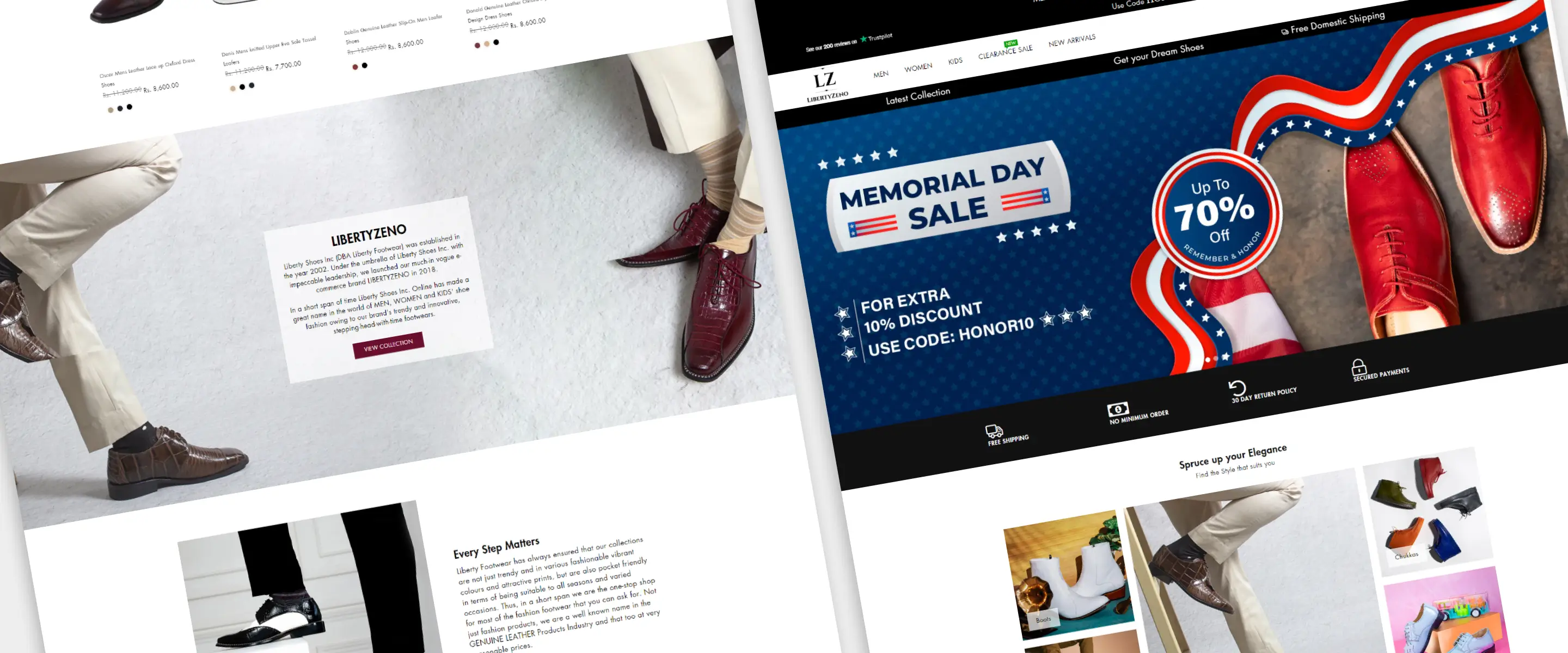Overview
LIBARTYZENO is a burgeoning online shoe store based in the USA, catering to a diverse range of customers, including men, women, and kids. This case study outlines the development process of the LIBARTYZENO e-commerce website, highlighting key strategies, design decisions, and technological implementations aimed at creating a seamless and engaging shopping experience.
Tech stack
- Frontend - Javascript, ReactJS, HTML, CSS
- Backend & Admin Panel - Python, Django, Django REST, PostgreSQL, Google Analytics
- Cloud Server - Digital Ocean
Objectives

Development Process
Market Research and Planning
- Conducted comprehensive market research to understand the target audience, competitors, and current market trends.
- Defined clear project goals, timelines, and budget requirements.
- Created detailed user personas to guide design and functionality decisions.
Design and User Experience (UX)
- Developed wireframes and prototypes to visualize the website layout and user flow.
- Focused on creating a clean, modern design with easy navigation to enhance the user experience.
- Included features like product filtering, sorting, and a robust search function to help users find products easily.
- Designed a responsive layout to ensure the website functions well on all devices.
Technical Implementation
- Front-end Development: Used HTML5, CSS3, and JavaScript to build a responsive and interactive user interface. Utilized frameworks like React.js for dynamic content rendering.
- Back-end Development: Implemented a robust backend using Node.js and Express.js to handle server-side operations. For database management, MongoDB was chosen for its scalability and flexibility.
- E-commerce Functionality: Integrated e-commerce platform features using technologies like Shopify or WooCommerce for product management, shopping cart, and checkout processes.
- Payment Gateway: Integrated secure payment gateways such as PayPal, Stripe, and credit card processing to facilitate smooth transactions.
- Security: Implemented SSL encryption, secure user authentication, and regular security audits to protect user data and transactions.
Content Management and SEO
- Used a content management system (CMS) like WordPress or custom-built solutions to manage website content effectively.
- Implemented SEO best practices, including keyword optimization, meta tags, and high-quality content to improve search engine rankings.
- Integrated tools like Google Analytics for tracking website performance and user behavior.
Testing and Launch
- Conducted extensive testing, including usability testing, performance testing, and security testing to identify and resolve any issues.
- Performed beta testing with a select group of users to gather feedback and make necessary adjustments
- Launched the website with a marketing campaign to attract initial traffic and users.
Post-Launch Support and Optimization
- Provided ongoing technical support to address any post-launch issues.
- Continuously monitored website performance and user feedback to make improvements.
- Implemented regular updates and added new features based on customer feedback and market trends.
Results
Enhanced User Increased Traffic
Enhanced User Experience
Higher Conversion Rates:
Scalability
Conclusion
The development of the LIBARTYZENO e-commerce website involved a strategic approach focusing on user experience, security, and scalability. By leveraging modern technologies and best practices, the team successfully created a platform that meets the needs of its diverse customer base while setting the foundation for future growth and innovation.













